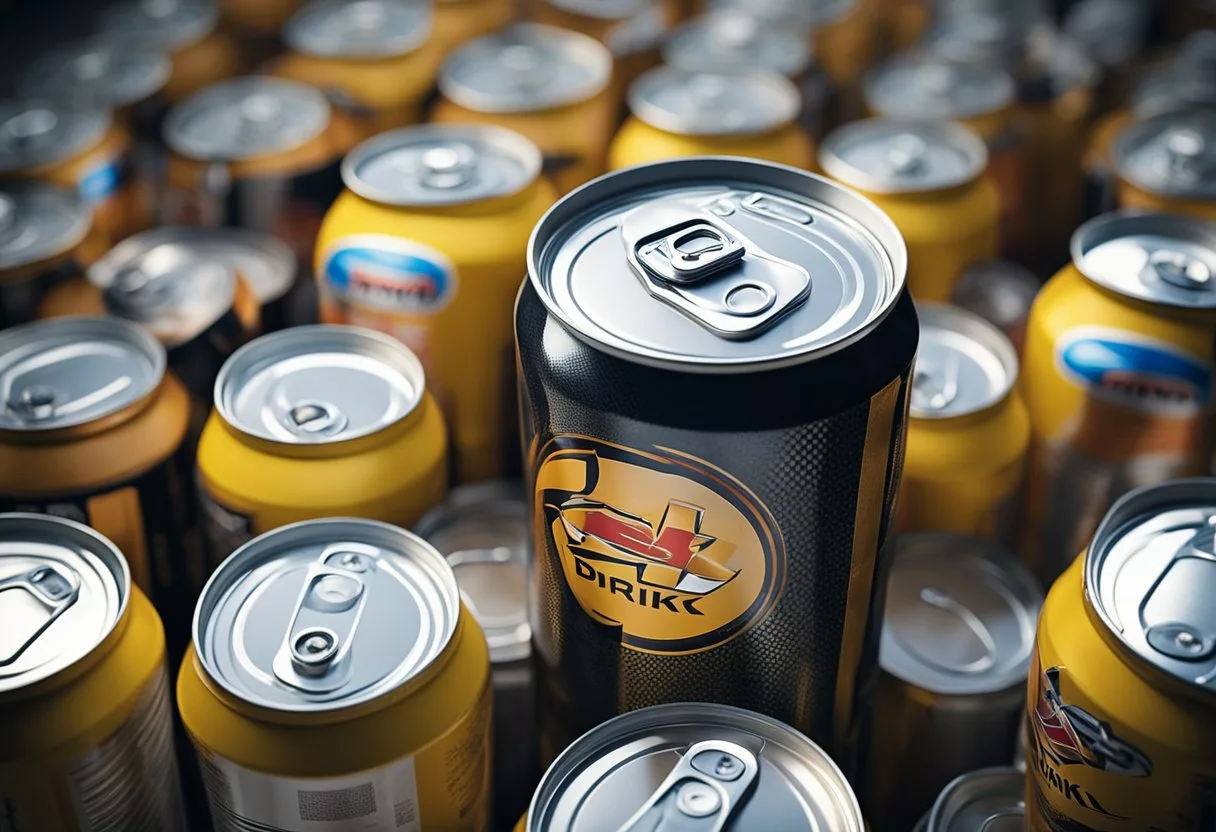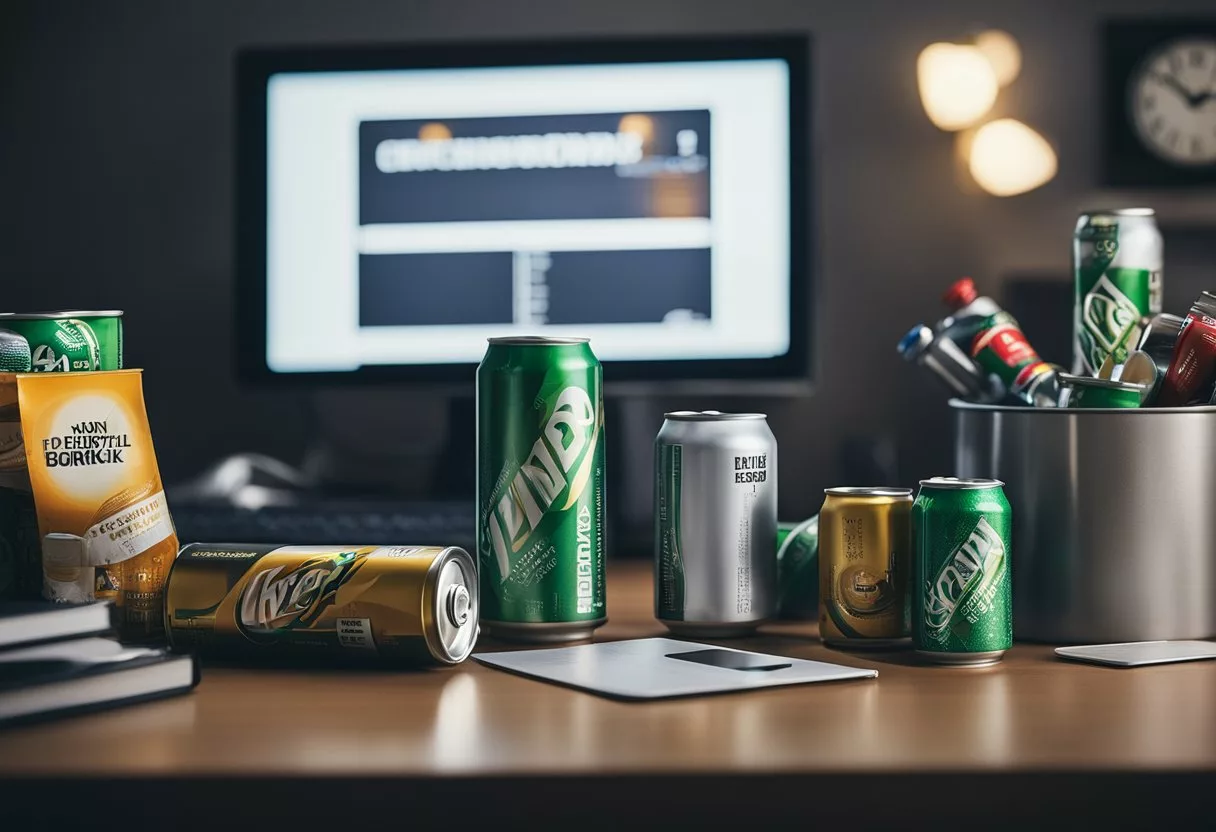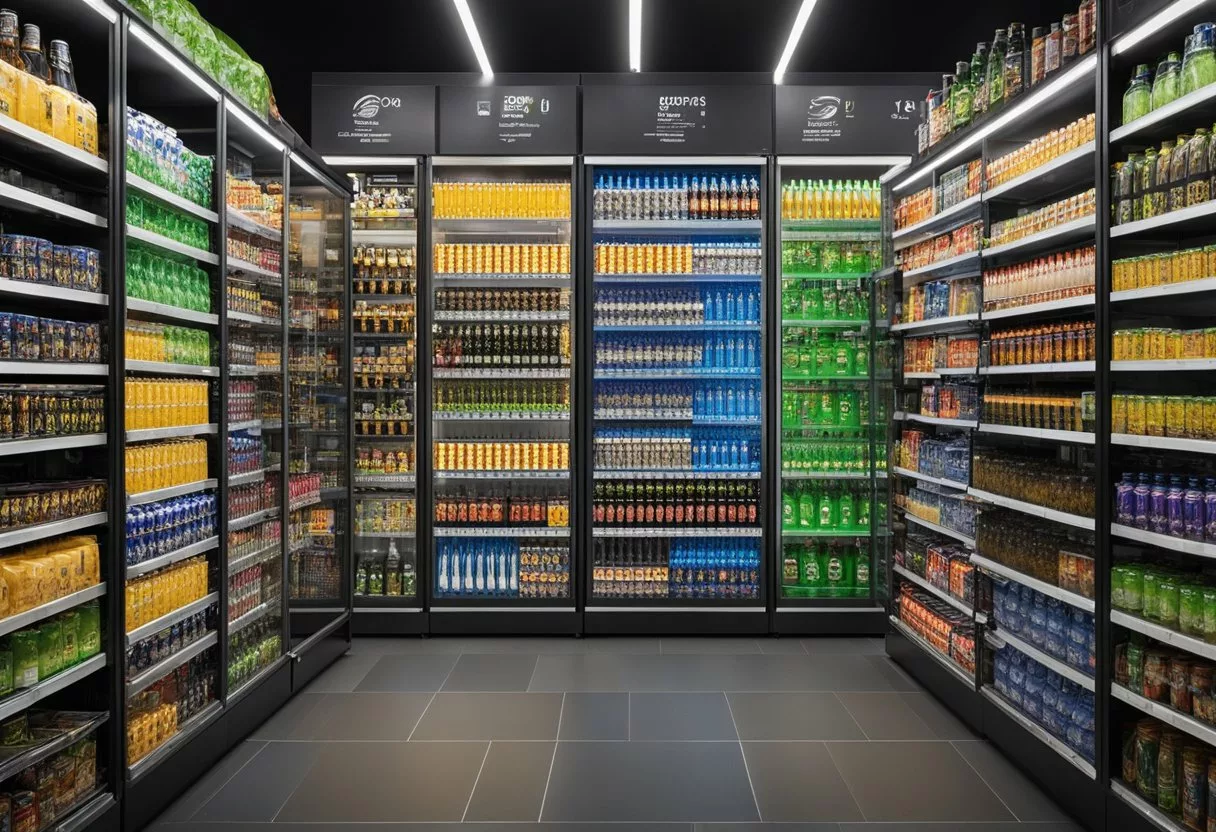Energy drinks have become a popular beverage choice for many people around the world. These drinks contain high levels of caffeine, sugar, and other stimulants that can provide a quick energy boost. However, consuming energy drinks on a daily basis can have negative effects on the body.

Introducing Sugar Defender, an advanced blend of 24 proven ingredients that support healthy glucose levels and natural weight loss.
One of the most significant effects of drinking energy drinks daily is an increase in heart rate and blood pressure. The high levels of caffeine and other stimulants in these drinks can cause the heart to beat faster and harder, which can lead to an increased risk of heart disease and stroke. Additionally, consuming large amounts of sugar can also lead to weight gain, which can further increase the risk of heart disease.
Another negative effect of drinking energy drinks daily is a decrease in sleep quality. The high levels of caffeine in these drinks can make it difficult to fall asleep and stay asleep, which can lead to fatigue and decreased productivity during the day. Additionally, the sugar in energy drinks can cause blood sugar levels to spike and then crash, which can also negatively impact sleep quality.
Understanding Energy Drinks

Energy drinks are beverages that are marketed as providing an energy boost. They are typically high in caffeine and sugar and often contain additional ingredients like guarana, taurine, and vitamins. While they may provide a quick energy boost, consuming them regularly can have negative effects on the body.
Key Ingredients and Their Effects
Caffeine is the primary ingredient in energy drinks, and it is known to increase alertness and improve cognitive performance. However, consuming too much caffeine can lead to negative side effects like jitteriness, anxiety, and insomnia.
Sugar is another common ingredient in energy drinks, and it can lead to a spike in blood sugar levels. This can cause a crash later on, leaving the person feeling more tired than before.
Other ingredients like guarana, taurine, and ginseng are often included in energy drinks for their supposed energy-boosting properties. However, there is little scientific evidence to support these claims.
Comparison with Coffee, Tea, and Soft Drinks
Energy drinks are often compared to coffee, tea, and soft drinks, but they differ in several ways. While coffee and tea also contain caffeine, they typically have lower levels than energy drinks. Soft drinks, on the other hand, are often high in sugar but do not contain caffeine in significant amounts.
It is important to note that consuming any of these beverages in excess can have negative effects on the body. However, energy drinks are particularly concerning due to their high levels of caffeine and sugar.
In summary, while energy drinks may provide a quick energy boost, their high caffeine and sugar content can have negative effects on the body. It is important to consume them in moderation and to be aware of the potential risks associated with their consumption.
Short-Term Effects on the Body

Energy drinks are often consumed for an immediate energy boost. These drinks contain high amounts of caffeine, sugar, and other stimulants that can have an immediate impact on the body. Here are some of the short-term effects of drinking energy drinks:
Immediate Impact on Energy Levels
Energy drinks can provide an immediate energy boost due to their high caffeine content. According to a Cleveland Clinic Health Essentials article, “Caffeine is a stimulant that increases alertness and energy levels. It works by blocking the action of a neurotransmitter called adenosine, which is responsible for making you feel tired and sleepy.” However, this energy boost is often short-lived and can lead to a “crash” later on.
Cardiovascular Responses
Energy drinks can also have an impact on the cardiovascular system. According to a comprehensive review of energy drinks, “The high caffeine content of energy drinks can cause an increase in blood pressure and heart rate, which can be dangerous for people with pre-existing cardiovascular conditions.” This increase in blood pressure and heart rate is often temporary, but it can have negative consequences for some individuals.
Changes in Alertness and Concentration
In addition to providing an energy boost, energy drinks can also have an impact on alertness and concentration. According to a Medical News Today article, “Caffeine can improve alertness and concentration, but too much can cause anxiety, restlessness, and sleep disturbances.” This can be particularly problematic for individuals who need to focus for extended periods of time, such as students or professionals.
Overall, while energy drinks can provide an immediate energy boost, they can also have negative short-term effects on the body. It is important to be aware of these effects and to consume energy drinks in moderation.
Long-Term Health Implications

Risk of Chronic Diseases
Long-term consumption of energy drinks has been linked to an increased risk of chronic diseases. According to a study published in the Journal of the American Heart Association, people who consume energy drinks regularly may be at a higher risk of developing heart disease, high blood pressure, and diabetes. The high levels of caffeine and sugar in energy drinks can cause heart palpitations, high blood pressure, and insulin resistance, which are all risk factors for chronic diseases.
Potential for Addiction and Withdrawal
Energy drinks contain high levels of caffeine and other stimulants, which can lead to addiction and withdrawal symptoms. The more a person consumes energy drinks, the more they may become dependent on them to function normally. This can lead to withdrawal symptoms such as headaches, fatigue, and irritability when they try to stop consuming them.
Impact on Mental Health
Energy drinks can also have a negative impact on mental health. The high levels of caffeine can cause insomnia, anxiety, and nervousness, which can lead to mood swings and depression. The sugar in energy drinks can also cause a spike in blood sugar levels, which can lead to a crash and cause feelings of fatigue and irritability.
To avoid the potential long-term health implications of energy drinks, it is recommended that people limit their consumption of these beverages. It is also important to stay hydrated and consume a balanced diet to maintain good health.
Effects on Different Demographics
Adolescents and Children
Energy drinks are not recommended for children and adolescents. According to a study, excessive consumption of energy drinks can lead to serious health problems such as cardiovascular problems, nervous system disorders, and potential addiction. Children and adolescents are more susceptible to these risks due to their smaller body size and lower tolerance to caffeine. In addition, energy drinks can negatively affect their sleep patterns, which can lead to a range of health problems.
Pregnant and Breastfeeding Women
Pregnant and breastfeeding women should avoid consuming energy drinks. As per the National Center for Complementary and Integrative Health, the high caffeine and sugar content in energy drinks can cause adverse health effects for both the mother and baby. Energy drinks can also interfere with the absorption of important nutrients, such as calcium and iron, which can lead to complications during pregnancy and breastfeeding.
Healthy Adults with Pre-existing Conditions
Healthy adults with pre-existing conditions, such as heart disease, high blood pressure, and diabetes, should be cautious when consuming energy drinks. According to a mini-review, energy drinks can have negative effects on cardiovascular health, especially when consumed in large quantities. Energy drinks can also cause blood sugar levels to spike, which can be dangerous for people with diabetes. In addition, energy drinks can interact with certain medications, such as antidepressants and blood thinners, which can lead to adverse health effects.
Overall, it is important for individuals to be aware of the potential health risks associated with consuming energy drinks. It is recommended to limit or avoid consumption, especially for children, pregnant and breastfeeding women, and those with pre-existing health conditions.
Nutritional Considerations

Sugar Content and Caloric Value
Energy drinks are often loaded with added sugars, which can lead to a spike in blood sugar levels followed by a rapid crash. According to a nutritionist at EatingWell, most energy drinks meet or significantly exceed the recommended daily allowance for added sugar, which is 24 grams per day for women and 36 grams per day for men. This high sugar content can contribute to weight gain, dental problems, and an increased risk of chronic diseases such as type 2 diabetes.
In addition to added sugars, energy drinks are also high in calories. A single 16-ounce can of a popular energy drink can contain up to 200 calories, which is equivalent to a small meal. Consuming energy drinks regularly can lead to an excessive calorie intake, which can contribute to weight gain and other health problems.
Vitamin and Mineral Content
While energy drinks may contain some vitamins and minerals, they are not a reliable source of these essential nutrients. According to a registered dietitian at Cleveland Clinic, the amount of vitamins and minerals in energy drinks is typically low, and the quality of these nutrients is often poor. In contrast, whole foods such as fruits, vegetables, and whole grains are rich in vitamins and minerals and offer a wide range of health benefits.
Comparison with Dietary Supplements
Energy drinks are often marketed as a dietary supplement, but they are not subject to the same regulations as other supplements. According to an article on Healthline, energy drinks are not required to undergo safety testing or receive approval from the FDA before they are sold to consumers. This lack of regulation means that the safety and efficacy of energy drinks are not guaranteed.
In contrast, dietary supplements are subject to strict regulations and must undergo safety testing before they can be sold to consumers. While dietary supplements may also contain added sugars and calories, they are often formulated to provide specific vitamins, minerals, or other nutrients that are lacking in the diet.
Overall, it is important to be aware of the nutritional considerations associated with consuming energy drinks regularly. While they may provide a temporary boost of energy, they are not a reliable source of essential nutrients and can contribute to a range of health problems.
Regulatory and Safety Perspectives
FDA Guidelines and Public Health Recommendations
The Food and Drug Administration (FDA) has set guidelines for the regulation of energy drinks. The FDA limits the amount of caffeine in soft drinks to 71 milligrams per 12-ounce serving. However, energy drinks are not classified as soft drinks, and therefore, they are not subject to the same regulations. The FDA requires that energy drink labels list the amount of caffeine in each serving, but there is no limit to the amount of caffeine that an energy drink can contain.
The World Health Organization (WHO) has also expressed concerns about the safety of energy drinks. The WHO recommends that children and adolescents should not consume energy drinks, and that adults should limit their consumption to no more than 400mg of caffeine per day.
The American Academy of Pediatrics (AAP) has also recommended that children and adolescents should not consume energy drinks. The AAP has stated that energy drinks can cause heart palpitations, seizures, and strokes in children and adolescents.
Safe Consumption Practices
To reduce the risk of adverse health effects associated with energy drinks, the Centers for Disease Control and Prevention (CDC) recommends the following safe consumption practices:
- Limit consumption: Energy drinks should not be consumed in large quantities, and individuals should limit their consumption to no more than one can per day.
- Avoid mixing with alcohol: Energy drinks should not be mixed with alcohol as it can increase the risk of adverse health effects.
- Avoid use before or during exercise: Energy drinks should not be consumed before or during exercise as it can lead to dehydration and other health problems.
- Read labels: Individuals should read the labels on energy drinks to understand the amount of caffeine and other ingredients in each serving.
In conclusion, while energy drinks may provide a temporary energy boost, they can have adverse health effects if consumed in large quantities or mixed with alcohol. It is important to follow safe consumption practices and to be aware of the amount of caffeine and other ingredients in each serving.
Market and Consumer Trends

Sales and Popular Brands
The global energy drink market has been growing steadily over the past few years. In 2020, total energy drink sales reached $57 billion globally [1]. Red Bull is currently the leading energy drink brand in the market, followed by Monster, Amp, NOS, Celsius, and Rockstar [1].
Consumer Behavior and Preferences
Consumers of energy drinks are typically young adults and athletes who are looking for a quick energy boost. However, there are concerns about the potential health risks associated with excessive consumption of energy drinks [2]. Despite these concerns, there is still a high demand for energy drinks among consumers.
According to a report by Mintel, changing consumer demands are driving the energy drink industry to adapt. Consumers are looking for healthier options and are increasingly interested in natural and organic ingredients [3]. As a result, some energy drink brands are starting to offer low-sugar and low-calorie options.
In addition, some consumers are turning to energy shots as an alternative to traditional energy drinks. 5-hour Energy is currently the leading energy shot brand in the market [4]. Energy shots are smaller in size and contain less caffeine than traditional energy drinks.
Overall, the energy drink market is showing healthy growth, and consumer preferences are changing. As more consumers become concerned about their health, it will be interesting to see how the industry continues to adapt to meet their needs.
[3] Mintel
[4] EatingWell
Potential Side Effects and Adverse Reactions
Energy drinks have been associated with a variety of physical and psychological side effects. The following subsections outline some of the most commonly reported side effects and reactions.
Physical Side Effects
Regular consumption of energy drinks can lead to several physical side effects, such as headaches, palpitations, and poor sleep quality. The high levels of caffeine and sugar in energy drinks can cause headaches, especially if consumed in large amounts. Palpitations, or rapid heartbeats, are another common side effect of energy drinks, which can be especially dangerous for individuals with pre-existing heart conditions.
Energy drinks can also interfere with sleep quality. The high caffeine content in energy drinks can keep individuals awake for longer periods, leading to poor sleep quality and insomnia. This can have a negative impact on overall health and well-being.
Psychological Reactions
In addition to physical side effects, energy drinks can also cause psychological reactions. Irritability is a common side effect of energy drinks, which can be attributed to the high levels of caffeine and sugar. Energy drinks can also cause anxiety, nervousness, and restlessness, especially if consumed in large amounts.
Interactions with Medications and Alcohol
Energy drinks can interact with certain medications and alcohol, leading to adverse reactions. For example, energy drinks can interfere with the absorption of some medications, reducing their effectiveness. Energy drinks can also increase the risk of alcohol-related injuries, as they can mask the effects of alcohol and lead to excessive drinking.
It is important to note that the effects of energy drinks can vary depending on the individual and the amount consumed. While energy drinks can provide a temporary boost of energy, regular consumption can have negative effects on physical and mental health. Individuals who consume energy drinks on a regular basis should be aware of the potential side effects and take steps to reduce their consumption.